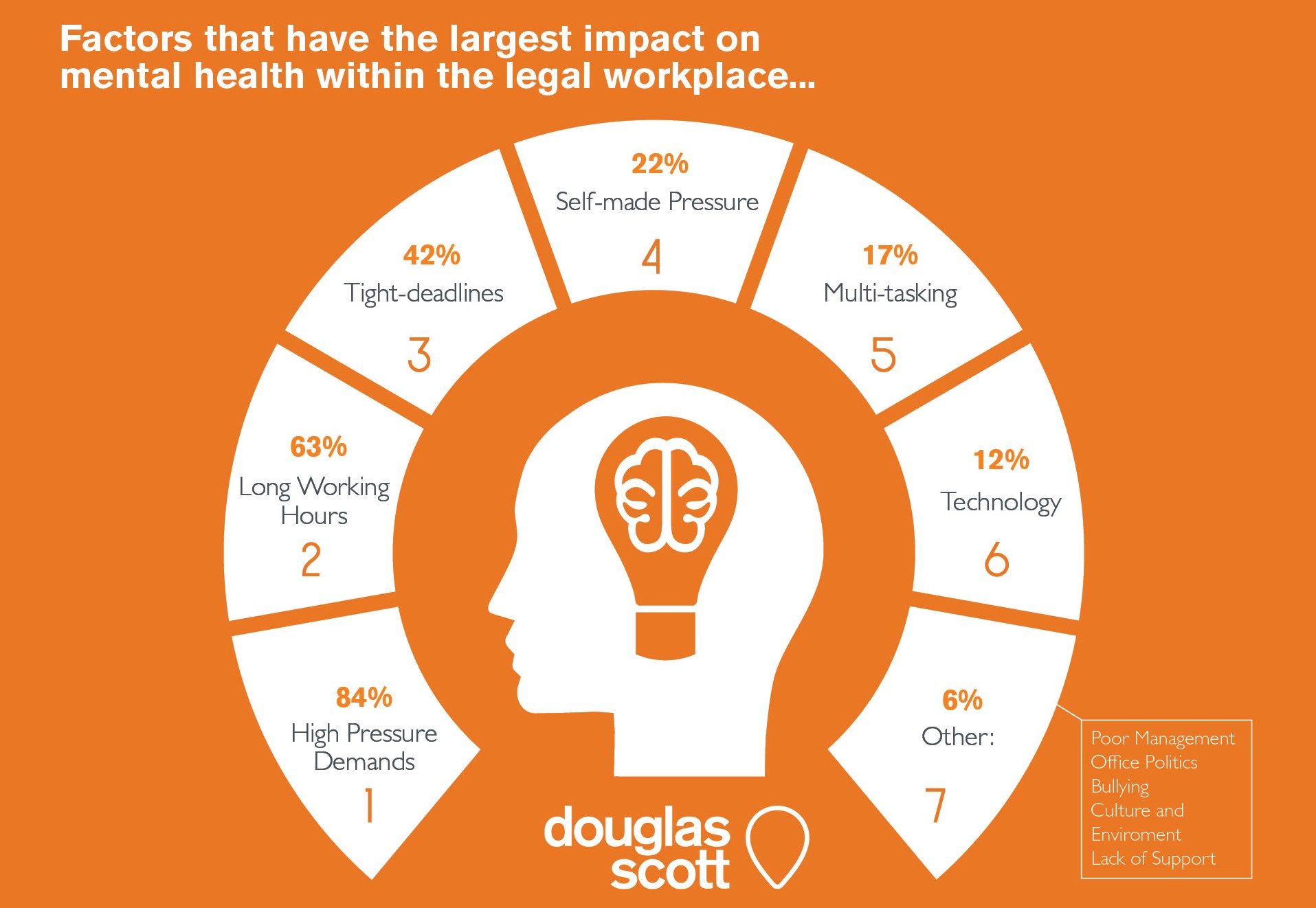Mindful of Mental Health
Posted in Latest News on 15 May 2019

This week, May 13 – 19, 2019 is UK Mental Health Awareness Week, centred this year around the theme of “Body Image”. The week also tackles stigma, stereotypes, and discrimination as well as promote awareness generally around mental health and well-being in both our personal and working lives.
Mental health is cited as the number one cause of sickness absence with 70 million workdays lost annually due to mental health related issues. Legal professionals will recognise that a career, especially within the legal industry conventionally is hard work, comes with long hours and has the potential to expose individuals to situationally sensitive material.
LawCare, a sector specific charity set up to offer support and advice around mental health and improve access to help, reported a 5% increase in calls to their helpline between 2018 and 2019. Of these calls, 26% attributed to stress, 19% to depression, and 11% to anxiety. Our own research from the 2019 Salary and Benefits Benchmarker revealed that, unsurprisingly, legal professionals believed high pressure demands, long working hours and tight deadlines had the biggest effect on mental health and well-being in the workplace.
According to the survey, 86% of legal professionals believe it is important for employers to provide mental health and well-being support, with 66% of this figure citing that it is in fact “very important”. The results show that 9% have not considered the impact of mental health and only 2% feel it is not important. Furthermore, an additional 2% believe it is not an employer’s duty of care.
However, there is a slight discrepancy between male and female opinion. Whereas 61% of Female legal professionals felt it was very important for employers within the industry to provide support, only 48% of their male counterparts echoed the same sentiment. Despite this, male legal professionals are not apathetic regarding the subject of mental health; 81% feel that it is an important topic that employers need to address in contrast to a total of 88% of females, both overwhelmingly in support of greater mental health awareness.
Of those that called the LawCare helpline in 2018, almost half were Junior Lawyers, Students, and those with a PQE level of less than 5 years. This may not be solely indicative of the pressures and expectations that exist early doors when establishing a legal career. It could also be the case that younger generations are more comfortable discussing mental health, having grown up in culture that normalises and encourages open discussion of the subject.
Conversations at the popular end of the spectrum can only go so far, to achieve results it may also be a case of revolution from above. The appetite and infrastructure for change is apparent; according to our survey 85% of current Business Leaders, Managers and Partners agree that it is important for employers to provide mental health and well-being support within the workplace. Operating in an incredibly pressured and demanding environment, those in positions of power recognising the importance of maintaining a healthy mind is a step in the right direction. In fact, behind ‘no route to progression in my current role’, the second and third highest stated reasons given for individuals who felt they were unable to climb the career ladder were: ‘work-life balance’ and ‘I don’t want the additional stress and responsibilities’.
So, what’s being done?
- One major initiative, the Mindful Business Charter developed by Barclays, Pinsent Masons and Addleshaw Goddard pledges to change avoidable working practices that impact mental health and wellbeing. The charter has had nine new signatories this week: Capsticks, CMS, DWF, Freshfields Bruckhaus Deringer, Herbert Smith Freehills, Michelmores, Osborne Clarke, Stone King, and Weightmans.
- LawCare, alongside the Law Society and the Solicitors Regulation Authority, have also launched the campaign #SupportingSolicitors to ‘promote the help available to solicitors dealing with personal challenges’. They have also created a web-chat service to work alongside their hotline and allow professionals to seek immediate online support which will be piloting on the 1st of July.
- Last but not least, Gowling WLG teamed up with Doggy De-Stress, inviting some four-legged friends into their offices in London to help collar stress and anxiety levels!
Mindfulness of mental health and well-being is not just a hot topic, the conversation is here to stay. Plenty of improvements can be made, not just in the legal sector to ensure that individuals are supported and encourage preventative measures that ensure issues do not arise unnecessarily.
For more insight into the legal world, check out the latest copy of our Salary and Benefits Benchmarker here.
If you’re a legal professional that would like some confidential help, we would recommend you contact LawCare here.
Latest insight
-
How popular really is hybrid working?
07 Apr 2025 -
What is the top priority for law firm leaders?
20 Jan 2025 -
How to make your 2025 Legal dreams come true!
13 Jan 2025 -
What poor mental health is costing firms...
13 Nov 2024 -
Beyond the surface: How law firms are quietly advancing social mobility
05 Nov 2024